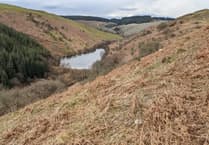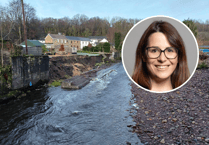Local politicians have reacted to Welsh Water's admission that it has been illegally spilling untreated sewage at treatment plants for years.
After being given analysis by the BBC, the company said between 40 and 50 of its wastewater treatment plants are operating in breach of their permits.
The analysis was shared with the BBC by mathematician and former University College London Professor Peter Hammond, from campaign group Windrush Against Sewage Pollution.
After requesting data on 11 Welsh treatment plants, Prof Hammond found that 10 had been releasing untreated sewage in breach of their permits.
One of these 10 was at Cardigan, which discharges into the estuary of the Afon Teifi. Cardigan Bay is home to Europe’s largest population of bottlenose dolphins.
Prof Hammond’s investigation revealed that the Cardigan works discharged on 1,146 days between January 2018 and May 31 2023 - or on 58 per cent of the days in that five-and-a-half year period. On these days, untreated sewage was allowed to enter the Teifi without the works being at full capacity.
Prof Hammond described it as “the worst sewage works” he’d ever encountered in terms of illegal discharges.
Steve Wilson, managing director for wastewater services at Welsh Water, told the BBC: “We’re not proud of this at all.
“It’s a very uncomfortable position to be in - but it’s not for the want of trying. We have been trying to fix this.”
Work is set to begin on a new £20 million treatment plant for Cardigan in 2025.
The BBC’s report said that the regulatory body, Natural Resources Wales (NRW), has had knowledge of the problems at the Cardigan plant for eight years. Although NRW has issued enforcement notices, no fines have been imposed.
Huwel Manley, head of operations for south-west Wales at NRW, told the BBC: “We have prosecuted Welsh Water on a number of instances for pollution events, just not for low flow spills as is the case here.
“But we are working with trying to set national guidance along with England so that we have a more standardised approach as to how and when we take that prosecution route.”
At the Brecon treatment plant which discharges into the Usk, there were found to be 52 breaches over the same period and at Builth Wells (Wye) there were 99.
Across the country, 11 rivers and river catchments were exposed to untreated sewage pollution in total for over 100,000 hours. This includes two Special Areas of Conservation (SAC) and three Sites of Special Scientific Interest (SSSI).
As well as one of only two UK sites with resident bottlenose dolphins, other sites affected by the spilling include commercial mussel and cockle beds and important salmon, sea trout, lamprey and brown trout spawning grounds.
MP for Brecon and Radnorshire Fay Jones expressed her deep disappointment following the news.
“It’s absolutely shocking to see analysis today that reveals very significant breaches by Welsh Water over recent years, with 52 illegal spills at Brecon and 99 at Builth Wells alone,” she said.
“Welsh Water should absolutely have been monitoring this more effectively and it is imperative that they start properly doing so.
“The Welsh Government must also step up and crack down on water companies not complying with the law, as the UK Government is doing.”
MS for Brecon and Radnorshire James Evans said he condemns the news “to the highest degree”.
“The people of Wales are quite rightly furious to learn of today’s revelations and the inaction over this crisis from Welsh government,” he said.
“This should call for a serious review of how sewage is monitored at installations across Wales. Our unique and historical rivers are being regularly polluted by an organisation that is supposed to placing public health at the top of its agenda.”
Mr Evans added: “Just last week, I undertook a site visit to Brecon Treatment Works, to oversee the progress being made on the £9m worth of investment into improving onsite operations. These upgrades will help increase the capacity of the treatment works to accommodate future growth within the area and reduce the amount of phosphorous from the treated wastewater before it is then returned safely back to the environment.
“This is just one site in Mid Wales. We have many other wastewater treatment sites that are desperate need of upgrading and modernisation. I will today be seeking clarity on the levels of sewage being dumped into our rivers within Brecon & Radnorshire and ask for immediate action to be taken on reversing this.”
MS for Mid and West Wales Jane Dodds MS has called for a review of Welsh Water following their admission.
“This is a shocking admission and the Welsh Government can no longer dodge the issue,” said Ms Dodds.
“We have the second highest bills across the whole of England and Wales, company bosses have been awarded thousands in bonuses and at the same time have been illegally dumping sewage into our rivers.
“I have repeatedly led calls in the Senedd for tougher action on sewage dumping and for a full review of Dŵr Cymru and it’s operation.
“The Welsh Labour Government must take those calls seriously or risk the future of our rivers.”





Comments
This article has no comments yet. Be the first to leave a comment.